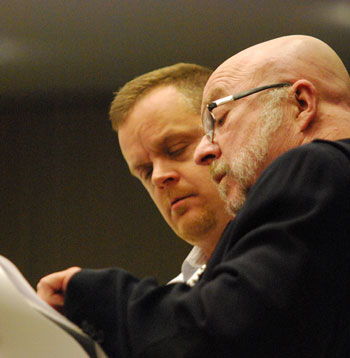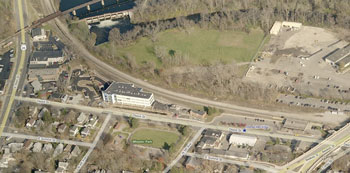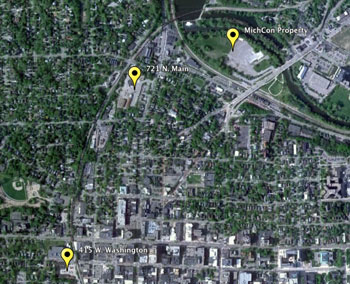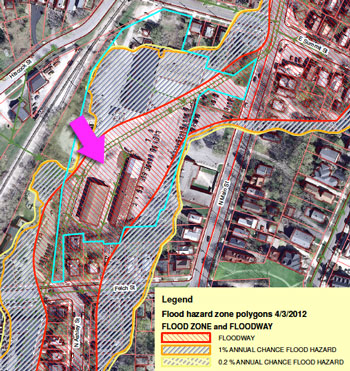Planning staff and commissioners, on a walking tour as part of their retreat, pause to help a stranded motorist push a stalled car at Main & Summit off the street into 721 N. Main – a city site that was part of the tour. [photo] Planning manager Wendy Rampson directs traffic. [photo]
Stories indexed with the term ‘721 N. Main’
721 N. Main
Demolition of a former city fleet services building under way – the long, concrete-block one: [aerial view from Google Maps] MacKenzie Co. crew apparently separating recyclable metals from roof structure. [photo]
Friction Emerges Between Council, Court
Ann Arbor city council meeting (June 17, 2013): Budget items for the 15th District Court drew more attention than any other single topic, taking up more than an hour of the council’s deliberations. The council also devoted more than a half hour to an item related to a Department of Energy grant that could lead to the installation of a wind generator on the property of Pioneer High School.

From left: 15th District Court judge Christopher Easthope – a former Ann Arbor city councilmember – and 15th District Court administrator Keith Zeisloft at the council’s June 17 meeting. (Photos by the writer.)
The main court-related item was part of an annual adjustment to the current fiscal year’s budget (FY 2013), which ends on June 30. The adjustment is made on a routine basis in order to bring the budget in line with actual expenditures. The general fund budget adjustment that was eventually approved by the council increased it by $567,000.
And of that amount, a significant part was attributable to the 15th District Court – including $112,000 in salary increases based on an interest in retaining employees, $203,000 due to a “catch up” payment to the law firm that provides indigent representation, and a back-bill for security from Washtenaw County for two fiscal years for $110,000. None of the salary increases went to judges, whose compensation is set through state statute.
The council was essentially being asked to approve the accounting adjustment for money that had already been spent this year.
The city’s budget for the next fiscal year – approved by the council last month, on May 20, 2013 – already incorporated the court workers’ salary increases going forward, and councilmembers had been apprised of the raises before their budget deliberations in May. The council’s deliberations on May 20 had not focused on those raises, but rather on the possibility of reducing the court’s budget in order to fund additional police officers for the city.
At the June 17 meeting, all three judges of the court plus the court administrator were on hand – as some councilmembers drew out a disagreement regarding how the wage increases should have been approached. At least some councilmembers felt the court should have asked the council before awarding wage increases to its workers.
Tom Crawford, the city’s chief financial officer, indicated at the meeting that if the council had not approved the budget adjustment for the court, it would likely have generated a note in next year’s audit.
Other court-related items on the council’s agenda included a new $240,000 annual flat-fee contract with Nassif and Reiser – the firm that provides indigent representation for the court. The council also approved a $160,000 contract with the Washtenaw County sheriff’s office for weapons screening at the Justice Center, the building next to city hall that houses the 15th District Court.
The council approved two items related to the court’s special Sobriety Court, one of which was a $65,000 grant program contract with the nonprofit Dawn Farm to provide in-patient and out-patient drug abuse counseling to 15th District Court defendants. It was approved over the dissent of Sabra Briere (Ward 1), who objected to the accompanying provision that waived a requirement that Dawn Farm adhere to the city’s living wage ordinance.
The wind generator item was originally on the consent agenda, but was pulled out for separate consideration. The council had previously voted unanimously at its Jan. 7, 2013 meeting to accept a roughly $950,000 U.S. Department of Energy grant for installation of the wind generator. The council was asked on June 17 to spend about $50,000 of the grant proceeds on an initial environmental assessment, required before the project can move forward. Three councilmembers balked at the request, but the resolution was ultimately approved.
In business related to revisions of local laws, the council gave final approval to an ordinance change that limits use of fireworks to between the hours of 8 a.m. and midnight. And the council gave final approval to the city’s outdoor sign ordinance that limits the incorporation of digital technology into outdoor signs – in a way that prohibits such use for billboards. However, the council again delayed taking an initial vote on an ordinance that would regulate how local law enforcement officials can use public surveillance cameras. The council did give initial approval to adopt the new fire code into the city’s ordinances.
In land use and development business, the council approved a revised development agreement for The Varsity. The agreement now incorporates a total of seven monthly parking permits that will be purchased at a premium cost under the city’s contribution in lieu (CIL) program. The council also gave approval to site plans for two projects: the State Street Center and 544 Detroit St. The 544 Detroit St. project included a brownfield plan, which was also approved. Another brownfield plan was on the council’s agenda – related to the Packard Square development on the site of the former Georgetown Mall. That plan had previously been approved, but an additional council vote was needed to change the set of activities that are eligible for reimbursement.
In connection with government-controlled land, the council approved $382,000 in additional operating support for the Ann Arbor Housing Commission. The council also passed a resolution committing up to $750,000 in general fund money to convert city-owned property at 721 N. Main to a greenway park. However, if the grants that the city expects to be awarded are actually received, none of that $750,000 would need to be spent on the project.
The council again heard public commentary about a homelessness outreach ministry in one of the city’s established parks – Liberty Plaza in downtown Ann Arbor, at Division and Liberty streets.
The council also approved revisions to collective bargaining agreements with the six unions in the police department, which gave members a 2% wage increase.
In a symbolic effort, the council voted to oppose expansion of I-94 in Detroit and I-75 in Oakland County – a proposal that’s part of SEMCOG’s 2040 Regional Transportation Plan with an estimated cost of $4 billion. SEMCOG subsequently adopted the plan.
The council put off voting on proposed changes to its internal rules, which could result in adding public commentary time at the council’s work sessions, but reducing the time allowed per turn from three minutes to two minutes. The council is expected to vote on the full set of rule changes at its July 1 meeting.
The proposed changes to the rules would move nominations and confirmation of appointments to a slot near the start of the meeting, instead of its current position near the end. For the June 17 meeting, the council’s confirmations came after midnight – and included reappointment of Bonnie Bona to the planning commission, and LuAnne Bullington to the taxicab board. [Full Story]
Council Commits Up to $750,000 for 721 N. Main
A commitment of up to $750,000 from the city’s general fund – to undertake planned improvements to the city-owned property at 721 N. Main – has been made by the Ann Arbor city council in action taken at its June 17, 2013 meeting. The commitment is a requirement for a grant application that the city is making to the Michigan Natural Resources Trust Fund for $300,000.
If the city’s plan unfolds as it expects, then none of the $750,000 in general fund money would be needed.
The improvements to 721 N. Main have resulted from work done by a North Main corridor improvement task force that has been working at the direction of the city council since the summer of 2012 … [Full Story]
FEMA Grant to Fund 721 N. Main Demolition
Two buildings on the city-owned 721 N. Main property near downtown Ann Arbor will now be demolished, using $87,704 in funds granted by the Federal Emergency Management Agency (FEMA).
The unanimous vote to accept the funds came at the council’s March 4, 2013 meeting. The 721 N. Main site is a former city maintenance yard, and is part of a … [Full Story]
Site Plan Moratorium: Commentary, No Action
Ann Arbor city council meeting (Feb. 19, 2013): Land use was the predominant theme of the meeting, linking several different agenda items – but the council chambers were filled mostly with people interested in just one of them.

The architecture of councilmember snacks at the Feb. 19, 2013 meeting provided a nutritional buffer against zoning out during the meeting: a stacked configuration of units for fruit and nuts. (Photos by the writer.)
The item drawing that interest was a proposed six-month moratorium on site plan review by the city for projects in the D1 (downtown core) zoning district. After holding a nearly one-hour closed session to review written legal advice from the city attorney’s office, the council decided to postpone the issue until March 4, its next regular meeting.
Exceptions to the proposed moratorium are provided for projects that have already received a recommendation of approval from the city’s planning commission. While that exception applies to a large residential project at 624 Church St., it does not exempt a larger project at 413 E. Huron. Planning staff had concluded that the East Huron project meets all the zoning requirements. But the planning commission’s vote on 413 E. Huron was only 5-3 in favor of recommending approval – one vote short of the six it needed. Ordinarily developers can, on their own initiative, bring a site plan to the city council for action, even without the planning commission’s recommendation.
If the resolution is enacted, then during the period of the moratorium, the planning commission would be directed to review the D1 zoning standards against site plans submitted since 2009, when new zoning regulations were established. The commission would be asked to make recommendations by June 4, its first meeting in June. The postponed resolution states that the council is supposed to take any action by Aug. 19, its second meeting in August.
Legal counsel for the 413 E. Huron developer addressed the council, intimating that if a moratorium were enacted, then a lawsuit would be filed against the city. Attorney Susan Friedlaender expressed skepticism about a provision in the postponed resolution that provided a way for an aggrieved party to have a hearing before the council. The council will take up the moratorium again on March 4.
Also postponed was a related resolution to reconvene the design guidelines task force, which would be asked to recommend improvements in the design review process. That resolution also will be taken up on March 4.
In another item related to downtown land development, the council completed an accounting step – establishing a project budget – in connection with roughly $9 million of bonds recently sold by the city. Those bonds are funding the public parking deck portion of the private City Apartments project now under construction at First and Washington. The Ann Arbor Downtown Development Authority will be making the bond payments.
Another land use issue postponed by the council was the proposed purchase of a parcel immediately adjacent to the Bluffs Nature Area. The postponement was based on council questions about the need for additional access from the west side of the nature area, and the price to be paid out of the city’s open space and parkland preservation millage. Related to that same millage, the council approved applying to the USDA Farm and Ranch Land Protection Program (FRPP) for matching funds to acquire development rights on two farms as part of the city’s greenbelt program.
In other land zoning issues, the council gave final approval to the owner-requested rezoning of some residential properties in the Arbor Hills neighborhood. The council also gave initial approval to a rezoning that would allow a retail project called The Shoppes to be built near the junction of Plymouth and US-23.
The council took action related to city-owned land at 721 N. Main, approving a $30,000 physical study of the main building on that former maintenance yard, to see if it can be re-used. At least part of that site is slated to become part of an Allen Creek greenway.
Across the street from 721 N. Main stands a collection of vacant houses that were supposed to be demolished to make way for the Near North affordable housing project. With that project now defunct, the city is moving to demolish the houses as nuisances. The council’s action on Feb. 19 was to accept about $96,000 in additional federal funds through a community development block grant, which can be used only for demolition of houses on the former Near North site.
In other action, the council formally adopted a sustainability framework that now will be part of the city’s master plan. And related to sustainability, the city council authorized the issuance of up to $1 million in bonds for the property assessed clean energy program (PACE). The PACE program provides low-interest loans for owners of commercial properties to invest in energy saving improvements.
Changes to the city’s living wage ordinance also were on the Feb. 19 agenda. The council had previously contemplated but ultimately postponed those changes. This time around, they were tabled. That means the issue will not come back, unless the council proactively decides to take up the proposal again in the next six months.
Also as a result of council action on Feb. 19, the municipal airport will get new fencing. [Full Story]
721 N. Main Building to Get $30K Study
The possibility of re-using the existing main building on the city-owned 721 N. Main parcel will be the subject of a $30,000 study that has been authorized by the Ann Arbor city council. The money will be drawn from the city’s general fund balance.
A task force established by the city council on May 7, 2012 has been working to develop recommendations for a much broader area than 721 N. Main, including the North Main corridor and extending to the Huron River. The task force is supposed to provide recommendations for the area by July 31, 2013.
But the task force has been asked to provide recommendations on the 721 N. Main property even earlier than that – because of application … [Full Story]
City Council Acts on Wind Power, Park Items
Ann Arbor city council meeting (Jan. 7, 2013): Most of the council’s first regular meeting of the year was taken up with discussion of a U.S. Department of Energy grant of nearly $1 million for construction of two wind turbines, likely to be constructed on Ann Arbor Public Schools property.

This apple on a councilmember’s desk could reflect the fact that part of the meeting was devoted to core priorities. (Photo by the writer.)
Councilmembers established a concern about the possible financial risks associated with the project, and a desire that public input be solicited on the ultimate decision for a site. But the vote was unanimous to accept the grant, which includes an obligation to provide roughly $480,000 in matching funds. That match is expected to be provided by Wind Products Inc., a company located in Brooklyn, New York.
At a meeting of the city’s energy commission held the following night, commissioners expressed their dissatisfaction that the proposal had not been brought to that body for review.
Some of the council’s deliberations on the wind turbines included the question of whether the effort was consistent with the council’s priorities for the next two years – ones that were formally adopted at the Jan. 7 meeting. The priorities, which had been identified in a Dec. 10 planning session, included the basic areas of: fiscal responsibility, public safety, infrastructure, economic development and affordable housing.
The council had three parks-related voting items on its agenda, neither of which prompted extended deliberations. One was approval of a design for the new skatepark in the northwest corner of Veterans Memorial Park, which is expected to start construction in the spring and be completed in the fall. A second voting item was the approval of another contract with the Conservation Fund, which helps manage operations for the city’s greenbelt and parkland acquisition programs.
A third parks-related voting item was authorization of a contract to replace roofs on two buildings at Cobblestone Farm.
Another agenda item – related to parks, but not requiring a vote – was a presentation from the council-appointed task force that’s been asked to make recommendations for a future vision of the North Main Street corridor, extending to the Huron River, including the MichCon property. They focused their presentation on the 721 N. Main property, for which the council had authorized two grant applications at its Dec. 17, 2012 meeting. The group has a summer 2013 deadline to make recommendations for the whole area.
Also on the topic of parks, the council heard from representatives of New Hope Baptist Church during public commentary, regarding a planned new dog park. Members of the congregation oppose the location of the dog park inside West Park, because it’s immediately adjacent to the church on Chapin Street. Also during public commentary, the council again heard calls for the top of the Library Lane parking garage to be designated as a park.
Some other items on the agenda could be grouped under land use and planning. The council gave approval to changes to the site plan for Packard Square, a proposed redevelopment of the former Georgetown Mall. The council had postponed the item from its Dec. 3, 2012 agenda.
And the council gave initial approval to a zoning request in connection with the proposed Summit Townhomes project site, just east of Stone School Road. The land was recently annexed into the city from Pittsfield Township.
Also as a result of council action, Ann Arbor residents could have some additional flexibility for parking cars on their front lawns – beyond just the occasions of University of Michigan football games.
In other business, the council approved the appointment of Carrie Leahy to the board of the local development finance authority (LDFA). The LDFA is a tax-increment finance (TIF)-funded entity that comprises the geographic area of the city of Ann Arbor’s downtown development authority, as well as the city of Ypsilanti’s DDA.
Other public commentary heard at the meeting included remarks opposing continued investment in companies that provide military hardware to Israel.
One hour immediately preceding the regular meeting was a special session of the council. Its agenda consisted only of a closed session, to discuss labor negotiations – which is an allowable topic for a closed session under the Michigan Open Meetings Act. [Full Story]
Ann Arbor Council Handles Green Agenda
Ann Arbor city council meeting (Dec. 17, 2012): The agenda for the council’s final regular meeting of the year was relatively light, but was weighted toward “green” issues – including parks and more general environmental items.

Chart showing projected greenhouse gas emissions if the city of Ann Arbor does nothing, compared to enacting steps outlined in the climate action plan, which was adopted by the city council at its Dec. 17, 2012 meeting.
The council approved two grant applications for future development of at least part of the city-owned property at 721 N. Main St. as a park. It’s seen as an element of a future Allen Creek greenway that would arc northward along the railroad tracks, starting from the East Stadium bridges to the Huron River. The applications were for unspecified amounts from the Michigan Natural Resources Trust Fund (MNRTF) and the Washtenaw County parks & recreation Connecting Communities program. Last year the city received two $300,000 grants from the MNRTF – for the future skatepark at Veterans Memorial Park, and for renovations to the boating facilities at Gallup Park.
The current grant applications came in the general context of an initial recommendation made by a council-appointed task force that has been meeting since the summer. That task force has a much broader geographic charge, which includes the North Main corridor, extending eastward to the Huron River and over to the MichCon property. The task force is due to make recommendations to the council on that broader area by the summer of 2013. However, the group was asked to weigh-in specifically on the 721 N. Main property by the end of this year – because of the grant application deadlines.
The North Main task force had been appointed at the same May 7, 2012 meeting when the council had heard from representatives of 555 Nonprofit Gallery and Studios on the physical survey work necessary for another city-owned property – at 415 W. Washington. At least part of that property is also envisioned as part of a future Allen Creek greenway. After appropriating $50,000 for physical testing at its July 16, 2012 meeting, the council on Dec. 17 allocated another $32,583 after bids came back.
In addition to green space, the council’s Dec. 17 agenda included two “green” resolutions – one that adopted a climate action plan and the other calling on the U.S. Environmental Protection Agency to enforce the Clean Air Act. Ann Arbor’s climate action plan calls for a reduction in greenhouse gas (GHG) emissions of 8% by 2015, 25% by 2025, and 90% by 2050. The reductions are compared to baseline levels measured in the year 2000. The action steps identified in the climate action plan are divided into four main categories: energy and buildings; land use and access; resource management; community and health. Those categories align with the city’s sustainability framework. The plan is also coordinated with a similar effort by the University of Michigan.
Other business handled by the council included another request to the Washtenaw County water resources commissioner’s office in connection with stormwater infrastructure for a street reconstruction project. The petition requested an application for $1.4 million in low-interest loans for a three-year project in the Platt-Packard neighborhood. Also connected to bricks-and-mortar infrastructure was an additional allocation of about $148,000 for the 2012 sidewalk repair and ramp installation program – the first year of a five-year cycle, corresponding to a millage approved by voters in 2011. The total mount of the 2012 sidewalk program was about $965,000.
The council also gave its recommendation to grant a micro brewer license to Biercamp Artisan Sausage & Jerky, a retail shop located at 1643 S. State St.
Initial approval was given by the council for a revision to the city’s ordinance regulating parking on front lawns. The change will make it easier to make arrangements for events other than University of Michigan football games.
And the council approved a $90,000 project budget that will allow for documents to be submitted digitally to the planning and development department. The project includes a public kiosk for reviewing plans.
The council also heard its typical range of public commentary, with topics including pedestrian safety, towing, and Palestinian rights. [Full Story]
Ann Arbor to Apply for Grants for 721 N. Main
The city-owned parcel at 721 N. Main was the subject of two grant applications authorized by the Ann Arbor city council at its Dec. 17, 2012 meeting. One application is for a Michigan Natural Resources Trust Fund grant. The other is to the Washtenaw County parks and recreation commission’s Connecting Communities program.
The city considers its proposal for 721 N. Main to be a strong candidate for the Connecting Communities grant, because it incorporates paths and trails through the site that could potentially be extended to connect to the cross-county Border-to-Border Trail. [.jpg of conceptual 721 N. Main site plan]
The conceptual site plan includes the following: (1) open space on the floodway portion of the site; (2) floodway portion … [Full Story]
Grant Applications Recommended for 721 N. Main
The Ann Arbor park advisory commission has voted to recommend applying for two grants related to the city-owned 721 N. Main property. PAC took the action on Dec. 4, 2012, before its land acquisition committee meeting.
The grants would come from the Washtenaw County Parks and Recreation Commission’s Connecting Communities program, and the Michigan Department of Natural Resources trust fund. No amounts were indicated in the resolutions that were approved by PAC, but up to $300,000 could be requested from the state, and at least that much could be requested from the county. The amounts in the applications will be determined after a phase 2 environmental assessment is completed later this year. That environmental study will give the … [Full Story]
North Main Task Force Gets New Member
A task force that’s looking at future planning for the North Main Street and Huron River corridor has been expanded so that it eventually can include outgoing councilmember Sandi Smith (Ward 1). She was appointed to represent the council on the group, but did not seek re-election to her council seat. The vote to expand the task force came at the council’s Nov. 8, 2012 meeting. Smith was also nominated and confirmed in a one-step process serve as an additional citizen member.
Mayor John Hieftje had indicated at the council’s Oct. 15, 2012 meeting that he would be moving to expand the task force in this way. The resolution was sponsored by Smith’s Ward 1 cohort, Sabra Briere. At the meeting, Briere … [Full Story]
Ann Arbor Council Adopts Hazard Plan
The city of Ann Arbor’s updated hazard mitigation plan was approved by the city council at its Sept. 17, 2012 meeting.
The plan submitted to the council for approval included some information that had not been updated. For example, the plan describes options for a structure located at 3432 Platt Road: “Sell structure if possible, otherwise demolish and lump with other Springbrook properties Study Swift Run to determine flood levels; if no study, remove structure to be safe, convert to open space use. Remove structures; study Swift Run to assess possibility for unoccupied use on part of parcel.” However, the 3432 Platt Road house was demolished in 2008.
The plan is required by the Federal Emergency Management Agency for grant funding. The city … [Full Story]
Burrowing Under Railroad Berm: Feasible?
On Wednesday, Ann Arbor city staff led a tour of property starting from the city-owned 721 N. Main site, northwards to the entrance ramp of M-14. On the tour were some members of a recently established North Main-Huron River corridor task force.

View of Depot Street from the south. The railroad track curves northward as it passes by Argo Dam, visible at the top of this image.
They were briefed on the status of the 721 N. Main property’s status with respect to potential environmental contamination – which is apparently less certain than what’s been portrayed recently by elected officials.
Task force members were also briefed on a related project that’s in its initial stages: a feasibility study for opening up the railroad berm separating the area south of Depot Street (including 721 N. Main) from the Huron River. The railroad tracks run along the top of the berm. The idea is to study the possible impact of replacing the solid berm – which acts as a dam for stormwater flow from the Allen Creek creekshed – with a culvert or a trestled system for suspending the tracks.
The primary impetus behind the berm project is stormwater management and flood mitigation. That’s reflected by the fact that the source of funds for the roughly $50,000 feasibility study would be from the city’s stormwater utility. The feasibility study would move ahead only if it’s approved by the city council, which will likely have the item on its agenda in about two months.
But the railroad berm study also has implications for pedestrian connections and riverside access – which the task force is supposed to study. The task force is asked to create a vision that, among other things, improves pedestrian and bicycle connections to Bandemer Park and increases public access to riverside parks.
So the railroad berm feasibility study has been coordinated with the goal of pedestrian accessibility. The RFP (request for proposals) for the study includes among its tasks a study of the potential for non-motorized access through the railroad berm.
The problematic character of pedestrian movement on the North Main corridor was evident during the July 25 tour. As the tour group made its way northward toward the M-14 entrance ramp, it repeated a pattern of fracturing into smaller clusters and re-grouping. That was partly a function of the size of the group (about 10 people), but also the corridor itself.
The relatively narrow walkable space – between the road to the left, and fences, buildings or vegetation on the right – features sidewalk slabs in need of repair and sections of dirt path that require single-file passage. Noise from rush hour traffic made conversation difficult along the way.
A year from now, on July 31, 2013, the task force is supposed to deliver its report on a vision for the corridor. Earlier than that, by the end of 2012, the task force has been asked to provide a recommendation on the use of 721 N. Main.
For task force members and members of the public, the same tour will be repeated on Aug. 1, starting at 5 p.m. from 721 N. Main. [Full Story]
City Council Parcels Out Tasks: Open Space
Ann Arbor city council meeting (May 7, 2012) Part 1: In Part 1 of this council meeting report, The Chronicle has collected those agenda items and discussion that relate to land use and open space, which was one of two dominant themes of the meeting. The other major theme was public art, which will be included in Part 2 of the report – along with other items not related to land use.

Three parcels received discussion at the council's May 7 meeting, from south to north: 415 W. Washington, 721 N. Main, the MichCon property. (Image links to higher resolution file)
In connection with different agenda items, the council discussed the future of three major parcels within the city, two of which are city-owned: 415 W. Washington and 721 N. Main, and the MichCon site near Broadway bridges.
First the council heard an update on the possible future of the city-owned 415 W. Washington property, located across from the Ann Arbor YMCA, which opened in 2005. The Y replaced the old Ann Arbor Technology Center, which had been the home of the 555 Nonprofit Gallery and Studios, along with independent artists and musicians, who rented space at the center. It burned in the course of a 2003 demolition.
The 555 Nonprofit Gallery and Studios went on to re-locate in Detroit. The group has some experience re-purposing buildings as space for artists, recently hosting a fundraiser for an additional property it has acquired – the 3rd Police Precinct in southwest Detroit. Artists can rent literal jail cells there as work space.
On Feb. 1, 2010, the Ann Arbor city council had established a task force – consisting of greenway advocates and members of the arts community – to explore the future use of the 415 W. Washington property. The Ann Arbor Arts Alliance was the group identified to represent the arts community interests.
Now, the 555 group appears ready to take responsibility for the arts portion of planning for the site. That’s the portion that entails re-using the existing building on the site, which is located in the Old West Side historic district. Carl Goines, a representative of 555, addressed the council on Monday night. Goines had co-founded the group 10 years ago in the tech center.
Goines described how an investment of around $45,000 is needed for surveying and environmental analysis of the 415 W. Washington site. That investment would be required whether the building is preserved or demolished, he said. Mayor John Hieftje indicated in his comments at the meeting that he’d be willing to give the group perhaps a year to establish a viable way to re-purpose the building, but also indicated an eagerness eventually to apply to the Michigan Natural Resources Trust Fund for a grant to develop the entire parcel as a park. If the 555 group could not find a way to rehabilitate the structure within a reasonable time, Hieftje indicated a willingness to pursue the option of asking the city’s historic district commission for permission to demolish the structure.
The other city-owned parcel discussed by the council was 721 N. Main, former site of a city maintenance yard. That came in connection with a council resolution to establish a task force to study the North Main corridor, and deliver a report in a year’s time, by July 31, 2013. Earlier than that, by the end of 2012, the task force is supposed to provide a recommendation on the use of 721 N. Main.
The city has an already-approved grant from the Federal Emergency Management Agency (FEMA) to pay for demolition of two buildings on the site – but not the main building. The 721 N. Main parcel will also likely be part of a Natural Resources Trust Fund grant application by the city in the spring of 2013.
The task force is also supposed to provide a recommendation on the future use of the MichCon property, between the Amtrak station and the Huron River. MichCon is currently undertaking an environmental cleanup of the land, and the standard to which MichCon remediates the parcel will depend on its intended future use. Hieftje has been clear about his preference – that the city acquire the land for a park. A possible source of funds the city could use for acquisition of such a park would be money generated by the open space and parkland preservation millage.
By administrative policy, a third of the revenue from that millage is overseen by the land acquisition committee of the city’s park advisory commission. The council confirmed a new appointment to that commission at Monday’s meeting – Ingrid Ault, who replaces the term-limited Gwen Nystuen. The other two-thirds of the millage revenues – for preservation of land outside the city as a greenbelt – is administered by the greenbelt advisory commission. And notice of two upcoming reappointments to that body was also on the agenda – for Catherine Riseng and Peter Allen.
Allen is a real estate developer, who might have alternatives in mind for MichCon’s property that include more than just a park. [Full Story]




